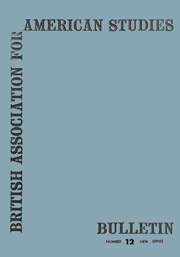No CrossRef data available.
Article contents
Immigrant Minority “Diplomacy”: American Jews and Russia, 1901–1912
Published online by Cambridge University Press: 17 February 2011
Extract
The influence of immigrant groups upon American foreign relations has been recognized in most standard American diplomatic histories, but reference is usually made in passing, and is rarely adequately documented. The administrations of Theodore Roosevelt and Taft are cases in point, and the influence of Jewish-Americans on certain of their decisions is the subject of this paper. No attempt has been made to exhaust the subjects of Jewish-American activities, Russo-American relations, or the Jews in Russia during the period analysed, but an effort has been made to illustrate, briefly, the general principle that immigrant minorities can exert an immense amount of pressure on American governments. Attention is focussed not upon the organization of a Jewish lobby, most notably the American Jewish Committee, but upon foreign policy decisions made in the light of what each President and Congress felt were demands and pressures from the potent Jewish minority.
- Type
- Research Article
- Information
- Copyright
- Copyright © British Association for American Studies 1964




